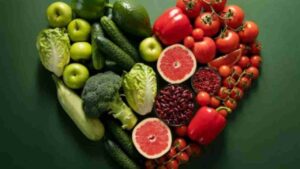Healthy Eating Nourishing Your Cardiovascular System Naturally
Healthy Eating Nourishing Your Cardiovascular System Naturally: Maintaining heart health is a paramount aspect of overall well-being, and one of the most effective ways to achieve this is through a mindful and heart-healthy diet. In this comprehensive guide, we will explore the various foods that play a crucial role in supporting cardiovascular health, focusing on expert insights and evidence-based information. From whole grains to leafy greens, omega-3 fatty acids to dark chocolate, each food group contributes to a holistic approach in nourishing your heart.

Section 1: The Foundations of Heart Health
The Interconnectedness of Heart Health:
Numerous facets of heart health, including blood pressure, inflammation, cholesterol levels, and triglycerides, are intricately linked to dietary choices. Adopting a balanced and nutritious diet can significantly lower the risk of heart disease and contribute to overall cardiovascular well-being.
Expert Advice on Heart-Friendly Eating:
Renowned health guru Mickey Mehta emphasizes the importance of deliberate dietary decisions. Professionals suggest focusing on fruits, vegetables, whole grains, and moderation in consuming saturated fats and added sweets. These choices form the foundation of a heart-healthy diet.
Section 2: Essential Foods for Heart Health
1. Whole Grains:
Whole grains, including millet, buckwheat, steel-cut or rolled oats, quinoa, and brown rice, are rich in soluble fiber. This fiber type aids in lowering cholesterol levels, and the lower glycemic index promotes stable blood sugar levels, reducing the risk of type 2 diabetes—a major precursor to heart disease.
2. Lentils:
Legumes, chickpeas, beans, and peas stand out as excellent providers of plant-based protein, dietary fiber, and essential minerals. Not only are they low in saturated fat, but they also actively help to lower cholesterol levels, contributing to a heart-healthy lifestyle.
3. Nuts and Seeds:
Almonds, walnuts, peanuts, flaxseeds, hemp, and chia seeds are nutritional powerhouses high in heart-healthy fats, fiber, and plant-based proteins. These foods play a crucial role in controlling LDL (bad) cholesterol levels while maintaining HDL (good) cholesterol levels.
4. Leafy Greens:
Leafy greens such as spinach, moringa leaves, dill, kale, cauliflower, cabbage, and broccoli are rich in vitamins, minerals, and fiber. These greens provide antioxidants like vitamin K and nitrates, contributing to blood clot management and lowering blood pressure by relaxing blood vessels.
5. Fruits:
Blueberries, strawberries, raspberries, pomegranate, grapefruit, peaches, and plums emerge as powerful heart-health partners due to their high antioxidant content. These antioxidants counteract oxidative stress and inflammation, crucial factors in the development of heart disease. Moreover, these fruits contribute to cholesterol management and digestive wellness.
Section 3: Heart-Boosting Nutrients
1. Omega-3 Fatty Acids:
The inclusion of Omega-3 fatty acids in your daily diet helps lower triglyceride levels and reduce inflammation. Sources like walnuts, flaxseeds, chia seeds, hemp seeds, beans, and edamame are recommended for reaping these heart-boosting benefits.
2. Virgin Olive Oil:
Extra virgin olive oil and olives, staples of the Mediterranean diet, are high in monounsaturated fats and antioxidants. These components aid in lowering LDL cholesterol and reducing inflammation, contributing to the cardiovascular benefits associated with this renowned diet.
3. Green Tea:
High in antioxidants like catechins, green tea offers potential heart health advantages. Its polyphenols fight oxidative stress and inflammation, and regular consumption may contribute to a decrease in LDL cholesterol.
4. Dark Chocolate:
Dark chocolate with at least 70% cocoa content boasts heart-health benefits. Flavonoids in dark chocolate help reduce inflammation, adding a delicious and indulgent element to heart-healthy eating.
Section 4: Building a Heart-Healthy Lifestyle
Holistic Approach to Heart Health:
Incorporating these heart-healthy foods into your daily diet forms a holistic approach to heart health. From regulating cholesterol levels to reducing inflammation, each food group plays a specific role in nurturing cardiovascular well-being.
Individualized Dietary Needs:
While these guidelines provide a comprehensive overview, it’s crucial to recognize that individual dietary needs may vary. Consulting with healthcare professionals for personalized advice based on specific health conditions is advisable.
Conclusion:
In conclusion, a heart-healthy diet goes beyond mere sustenance; it becomes a powerful tool in preventing and managing heart disease. From whole grains to omega-3 fatty acids, incorporating these nutrient-rich foods into your daily meals can significantly contribute to the well-being of your cardiovascular system. By understanding the interconnectedness of dietary choices and heart health, you empower yourself to make informed decisions that promote a healthier, happier heart. Remember, your heart is at the center of your well-being—nourish it wisely.




